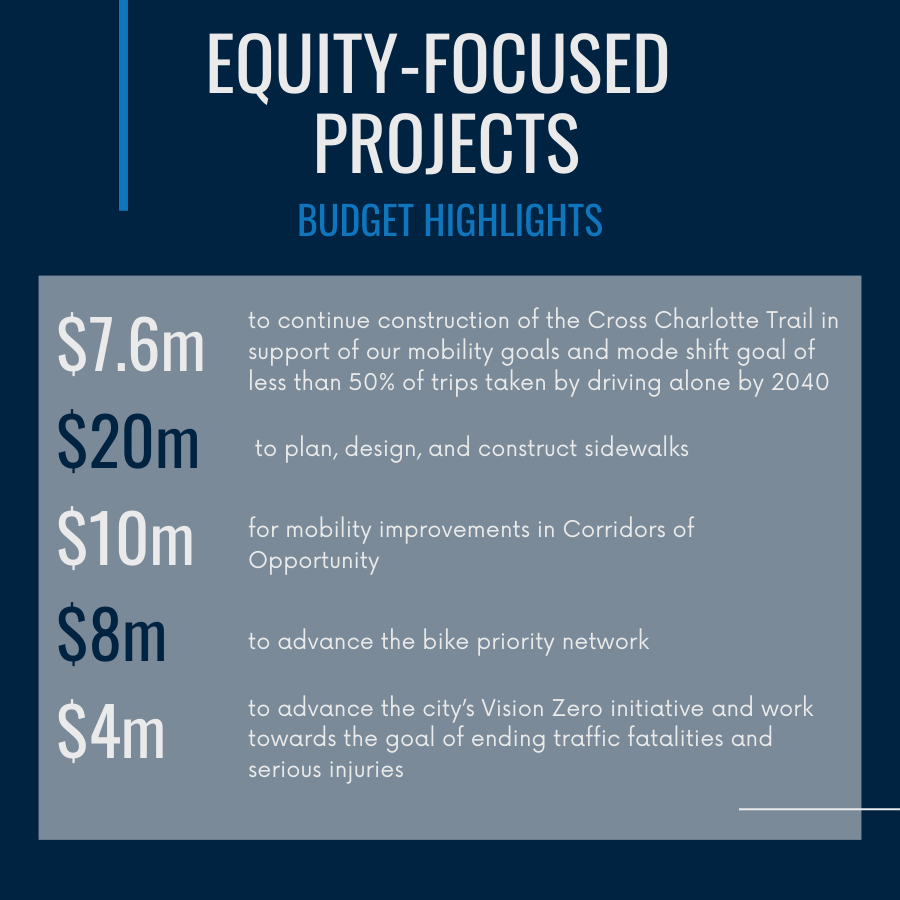City budget hearing: Fiscal Year 2024

Last Monday evening, our Director of Engagement and Impact, Meg Fencil, spoke at the City Council Budget Hearing to express support for the funding listed in the recommended budget to support numerous projects, centering around those that will 1) Provide safe and equitable mobility, 2) Support more affordable housing, and 3) Reduce Charlotte’s greenhouse gas emissions.
Highlights
A few of these equity-focused transportation projects in that recommended budget are:
- $7.6m to continue construction of the Cross Charlotte Trail in support of our mobility goals and mode shift goal of less than 50% of trips taken by driving alone by 2040.
- $20m to plan, design, and construct sidewalks
- $10m for mobility improvements in Corridors of Opportunity
- $8m to advance the bike priority network
- $4m to advance the city’s Vision Zero initiative and work towards the goal of ending traffic fatalities and serious injuries
Charlotte ranks 6th-to-last on walkability
Out of 130 cities with populations over 200,000, Charlotte is 6th from last on a walkability ranking by WalkScore, an organization that measures walkability by analyzing walking routes and the distance of local amenities. As we prepare to implement the UDO in June, let’s make sure we adopt a budget that aligns Charlotte’s land use and transportation goals.
It’s important to fund projects and staff that will help us achieve the 2030 Strategic Energy Action Plan goals of net-zero city operations by 2030 and becoming a low-carbon community by 2050, to reduce Charlotte’s greenhouse gas emissions that are driving climate change.
Investing in the transportation projects will help us achieve these goals by reducing our dependence on cars.
The pressure is on for net zero-carbon vehicles
We would also like to highlight the importance of investing in a net zero-carbon city fleet of vehicles as soon as is operationally feasible for each department, including battery-electric while also pursuing other emerging renewable energy technologies as they come online. We are encouraged by CATS’s progress on the 18-month Battery Electric Bus pilot and look forward to a full transition to BEBs and the charging infrastructure to support them.
We’re excited that Charlotte is on the leading edge of investing in carbon-neutral city operations with funding for the city’s first all-electric fire station in this budget. Residents need not only affordable transportation choices, but also affordable homes. This budget will help to preserve and create affordable housing.
Why it matters
Every day, we see vehicles parked in Charlotte’s bike lanes that are meant to provide an inviting space on the street for people of all ages and abilities to ride bikes. This is frustrating and dangerous. The Quality of Life team that would be supported through this budget — coupled with stiffer penalties for vehicle parking in bike lanes — will help to ensure that the city’s investment in bike lanes translates to increased numbers of people using the bike lanes. It’s important that we maximize our return on the many financial investments that Charlotte has made — and will make — in creating neighborhoods that are easily navigated by walking, biking, and public transit.
We see that this budget will help Charlotte make steady progress on building a more connected future, while knowing that the CIP and regular annual budget process is not keeping pace with the mobility needs of our rapidly growing population. In last November’s briefing from CDOT staff about the implementation of the Strategic Mobility Plan, we all learned that if Charlotte’s current rate of 76% of people driving alone continues, coupled with expected population growth, we’ll need to double our road capacity by 2040.
By investing in transportation choices today, we can avert the environmental, economic, and equity crisis that would accompany such a massively disruptive undertaking. As we move towards adoption of the CIP and the FY2024 budget, please join us in vocally advocating for the need for a local funding source so we can leverage state and federal resources to build a transformational mobility network that connects every person to the broader community by providing opportunities to walk, ride a bike or scooter, or ride public transit!
Thanks for reading!
As a nonprofit, community support is essential for us to keep doing what we do — including providing free articles like this. If you found this article helpful, please consider supporting Sustain Charlotte.
Want to stay in the loop? Subscribe to our weekly newsletter and follow us on Instagram, Facebook, and Twitter.
